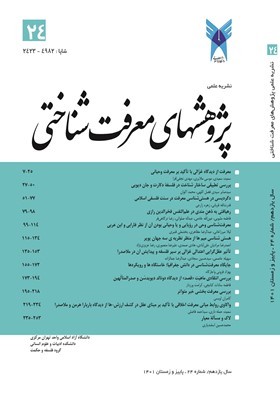بررسی تطبیقی ساختار شناخت در فلسفۀ دکارت و جان دیویی
محورهای موضوعی : پژوهشهای معرفت شناختیسید صابر سیدی فضل اللهی 1 , محمد اکوان 2 *
1 - دانشجوی دکترا گروه فلسفه، واحد تهران مرکزی، دانشگاه آزاد اسلامی، تهران، ایران.
2 - دانشیار گروه فلسفه، واحد تهران مرکزی، دانشگاه آزاد اسلامی، تهران، ایران
کلید واژه: شناخت, دکارت, پراگماتیسم, جان دیویی,
چکیده مقاله :
دکارت در ساختارِ شناختی خود قصد دارد تا بر مبنای ریاضیات، روشی مؤثر از جنس یقین را برای تحقیق و پژوهش ساماندهی نماید. ازنظر او ریاضیات، مجموعهای از حقایق ضروری و فراگیر است که مابین حالات مختلف ذهن، نظم و ارتباط ایجاد میکند. طبق معرفتشناسی دکارت، انسان تبدیل به محقق و کاشفی شده است که باید به کشف خودش بپردازد. ازنظر دکارت شناختِ یقینی امکانپذیر است. در سبک شناختی ساختارگرایانۀ او، عمل تابع صورت است درحالیکه سبک شناخت دیویی عملکردگرایی است که در آن صورت تابع عمل و رفتار است. دیویی با بررسی پیامدهای نگاه داروینی به جهان دیدگاه دکارت را نقد نموده و بیان میکند که شناخت درگرو تجربۀ انسان است و پرسشی که از امکان شناخت و معرفت آدمی میشود اساساً نادرست بوده است. دیویی در رویکرد پراگماتیستی خود با نگاهی دوباره به امر مطلق، نامشروط و یقینی، آن را تنها بهعنوان ابزاری پذیرفته که در صورت داشتن نتایج موفقیت بار به کار بسته میشود. شناخت، سازماندهی ذهنی از حقیقتی ابدی و مطلق نیست، بلکه فناوری، روش و تکنیک است و بایستی ابزاری برای اصلاحات اجتماعی، تنظیم و بهبود رفتار انسان و جامعه باشد.
In his philosophical structure, Descartes intended to organize, on the basis of mathematics, an efficient method of certainty for research and philosophy. The Mathesis is a body of universal and necessary truths of order and connection between ideas. According to Descartes' epistemology, man has become a researcher and discoverer who must discover himself. For Descartes, certain knowledge is possible, and in his structural cognitive style, action is a function of the form, while Dewey's cognitive style is a function in which form is a function of action and behavior. Examining the consequences of Darwinian views of the world, Dewey rejects Descartes' view: The question of the possibility of human knowledge has been fundamentally wrong. Dewey, by looking again at the absolute, the unconditional, and the certain, in philosophy, sees it only as a means to use if it results in success. Philosophy is not merely a mental organization of eternal and absolute truth, but a technology, method, and technique to be a means for social reform, regulation, and improvement of human and societal behavior.
استراترن، پل. (1389). آشنایی با دیویی، ترجمۀ کاظم فیروزمند، تهران، نشر مرکز.
بریه، امیل. (1385). تاریخ فلسفه قرن هفدهم، ترجمۀ اسماعیل سعادت، تهران، هرمس.
دکارت، رنه. (1372). قواعد هدایت ذهن، ترجمۀ منوچهر صانعی، تهران، دانشگاه شهید بهشتی.
همو. (1364). اصول فلسفه، ترجمۀ منوجهر صانعی، تهران، آگاه.
همو. (1369). تأملات در فلسفه اولی، ترجمۀ احمد احمدی، تهران، مرکز نشر دانشگاهی.
دیویی، جان. (1337). بنیاد نو در فلسفه، ترجمۀ صالح الوسعیدی، تهران، اقبال.
همو. (1334). اخلاق و شخصیت، ترجمۀ مشفق همدانی، تهران، صفی علیشاه.
رشیدیان، عبدالکریم. (1394). فرهنگ پسامدرن، تهران، نی.
سورل، تام. (1379). دکارت، ترجمۀ حسین معصومی همدانی، تهران، طرح نو.
سیدی فضلاللهی، سید صابر. (1399). با عینک پراگماتیسم، تهران، آذرفر.
قاسمی، اعظم. (1395). فلسفۀ اخلاق جان دیویی، تهران، پژوهشگاه علوم انسانی و مطالعات فرهنگی.
کاتینگم. (1392). جان، دکارت، ترجمۀ سیدمصطفی شهرآیینی، تهران، نشر نی.
گری لینگ، ای. سی... (و دیگران). (1380). نگرشهای نوین در فلسفه: معرفتشناسی، فلسفۀ دین، فلسفۀ اخلاق، فلسفۀ تحلیلی، ترجمۀ یوسف دانشور... (و دیگران)، قم، موسسه فرهنگی طه، دانشگاه قم، چاپ اول.
مایر، فردریک. (1374). تاریخ اندیشههای تربیتی، ترجمۀ علیاصغر فیاض، تهران، انتشارات سمت، جلد 2.
منابع انگلیسی
Descartes, R, Meditations on First Philosophy, Jonathan Bennett, https://www.earlymoderntexts.com/assets/pdfs/descartes1641.pdf, 2017a.
Descartes, R, Objections to the Meditations and Descartes’s Replies, Jonathan Bennett, https://www.earlymoderntexts.com/assets/pdfs/descartes1642.pdf, 2017b.
Dewey, John, Experience and Education, New York, London, Collier Books, MacMillan Pub, 1973.
Dewey, John, The quest for Certainty, New York, Capricorn Books, 1960,
Dewey, John, Logic: the نظریه of inquiry, New York, Henry Holt and Company, 1938.
Dewey, John, The Influence of Darwin on Philosophy, New York, Henry Holt and Company,1910.
Descartes, R. Rules for the Direction of the Mind, in Philosophical Writings (A Selection).Translated by M.E. Anscombe and P. Geach. London: Nelson, 1954.
Dewey, John, Evolution and Ethics, edited by Jo Ann Boydston, Carbondale and Edwardsville, Southern Illinois University Press,1972.
Dewey, J., Hickman, L.A., & Alexander, T.M. The Essential Dewey VOLUME1 Pragmatism, Education, Democracy, Bloomington: Indiana University Press, (1998 a).
Dewey, John, Art as Experience, New York, Capricon Books, G. P. Putnam’s Sons, 1958.
Dewey, J., Hickman, L. A., & Alexander, T. M. The Essential Dewey VOLUME2 Ethics, Logic, Psychology, Bloomington: Indiana University Press, (1998 b).
Friedman Michael, Einstein, Kant, and the Relativized A Prior, Transcendental Perspectives on Modern Physics, 253-267, 2002.
Gould, S.J, The Structure of Evolutionary Theory. Cambridge, Massachussets: Belknap Press of Harvard University Press, 2002.
Joachim, H.H, Descartes's Rules for the Direction of the Mind. Greenwood Press, 1957.
_||_
